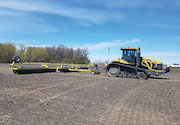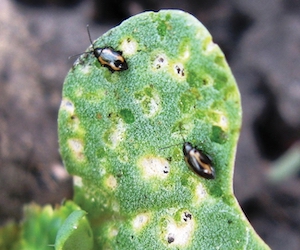| |
| |
 |
 |
| |
 |
|
@{mv_date_MMM d, yyyy}@ |
|
| |
Canadian farmers reported producing more wheat, barley and oats in 2019, while canola, corn for grain and soybean production were all down from a year earlier.
» Read more...
India announced plans to impose new restrictions on pea imports. Tariff and quota levels are unchanged for now, but new measures proposed include a minimum import price and restricting imports to one port in northeast India.
» Read more...
University of Saskatchewan researchers want to stop clubroot at the root. They have designed a chain of software programs that combine biology and computer science to help identify the clubroot infection pathway at a molecular level.
» Read more...
|
| |
 |
 |
| |
|
| |

Our early bird rate for the Plant Health Summit is ending on Jan. 24, a month away from the event itself! The Summit, to be held from Feb. 25 to 26, 2020, in Saskatoon, will cover a range of topics, from improving fertilization to maximizing fungicide use. The latest in plant health will be covered including plant growth regulators, insect beneficials, and smart farming. Take advantage of the early bird price of $120 and register today.
>> Register here |
| |
|
| |
 Land rolling has obvious benefits for managing stones in soybean fields. But should you roll a field that isn’t stony, and where the risk of combine damage from stones is very small? Two complementary studies are underway in Manitoba to assess the pros and cons of each method.
» Learn more
Land rolling has obvious benefits for managing stones in soybean fields. But should you roll a field that isn’t stony, and where the risk of combine damage from stones is very small? Two complementary studies are underway in Manitoba to assess the pros and cons of each method.
» Learn more |
| |
 Agriculture and Agrifood Canada researchers have discovered a new species of bacteria that could provide the key to detoxifying DON. The bacterium, which was found in an alfalfa field in southern Ontario, produces two enzymes which convert DON to a non-toxic or a much less toxic form by altering the molecular structure of deoxynivalenol. The possibilities for its application to reduce the impact of DON are endless.
» Learn more
Agriculture and Agrifood Canada researchers have discovered a new species of bacteria that could provide the key to detoxifying DON. The bacterium, which was found in an alfalfa field in southern Ontario, produces two enzymes which convert DON to a non-toxic or a much less toxic form by altering the molecular structure of deoxynivalenol. The possibilities for its application to reduce the impact of DON are endless.
» Learn more |
| |
|
| |

Striped and crucifer flea beetles and cutworms have become the main concerns in terms of early season pests for canola producers in Western Canada. If populations set in, they can all challenge a canola crop's ability to quickly establish a healthy, competitive stand. Growers can minimize their risk against damage from early season canola pests by using the best insecticide seed treatment combination available to protect their canola crop as it emerges.
>> Read more here |
| |
|
| |
|
|
| |
| |








